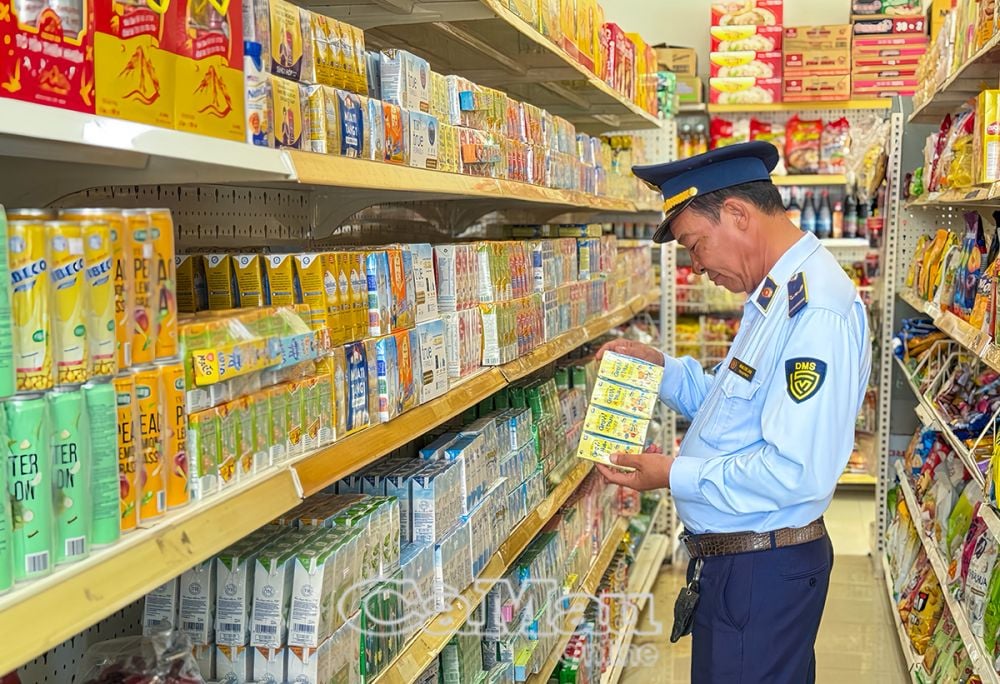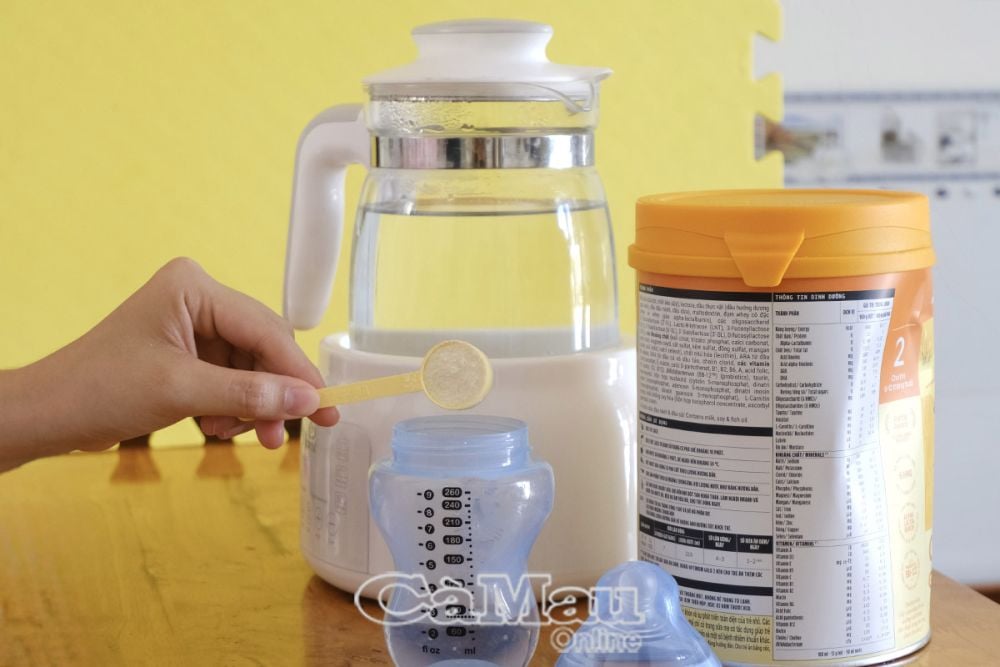Counterfeit milk is a product that does not meet the nutritional content as advertised, and may even contain impurities or additives not permitted for use in consumer food. Today, the boom in online shopping has inadvertently facilitated the easy infiltration of counterfeit milk into households. On social media platforms, advertisements for cheap imported milk with "shocking" promotions regularly appear, attracting the attention of uninformed consumers. Worryingly, consumers are easily deceived by low prices, even if the difference is only a few tens of thousands of dong, by the appearance resembling the real thing, and by attractive descriptions such as: "imported goods," "clearance sale," "stock of imported milk," milk with free gifts, etc., ultimately risking their family's health by consuming counterfeit milk.

Authorities are stepping up inspections of dairy products at retail stores.
Ms. Vo Tuyet Ngan, from Tac Van commune, Ca Mau city, shared: “Given the news about counterfeit milk and the proliferation of products of unknown origin and processed milk on the market, I feel very worried, especially since these products directly affect my child's health. This has also caused me to lose faith in buying indiscriminately online or from unreliable sources. Previously, when buying online, I thought that as long as the packaging was nice and the reviews were good, I could confidently choose to buy, but now I can't be careless anymore.”
Through media reports about authorities cracking down on counterfeit milk production and trading facilities, it's clear that the tricks of "fake milk technology" commonly occur in two forms: producing counterfeit products or using genuine packaging to refill substandard milk. Many facilities utilize used milk cartons, collected from scrap yards, then refurbish them and fill them with unregulated, unverified powdered milk. Even more sophisticatedly, fraudsters use machines to print counterfeit-proof labels and barcodes that look authentic, packaging the products using industrial machinery, making them very difficult to distinguish with the naked eye. Only when samples are tested are they found to be substandard in terms of nutrition, or even contaminated with bacteria.
A counterfeit milk carton is not just a commercial fraud; it also poses a direct risk to public health, especially for young children and the elderly – the most vulnerable groups. In the fight against counterfeit milk, in addition to the involvement of relevant authorities, the vigilance and wise purchasing decisions of consumers themselves are crucial.
Ms. Tang Kim Ngan, from Ward 6, Ca Mau City, stated: “As a wise consumer, facing the current situation of counterfeit milk, the first thing to do is to thoroughly research the source of the milk you are using for your baby. Choose reputable brands and buy milk products from large stores and supermarkets. Carefully check the barcode, expiration date, and anti-counterfeit seal. Most importantly, do not be tempted by cheap prices or buy from unreliable sources such as on social media or small shops without clear reviews. Pay attention to the taste and color of the milk after mixing; if you notice anything unusual, stop using it immediately. I hope that the authorities will increase inspections and strictly monitor milk sources so that consumers can feel more secure in choosing milk products for their children.”
Currently, to prevent businesses from reusing empty used milk cans, many mothers have taken decisive action by using sharp objects such as knives, nails, and hammers to punch holes in the cans before disposing of them. This is also one of the actions taken by savvy consumers to protect the health of the younger generation.
Not only are consumers suffering, but reputable retailers are also struggling due to the counterfeit milk problem. Ms. Nguyen Ngoc Bich, owner of a general store in Ca Mau City, shared: “I always import goods from authorized distributors, but many times customers have turned away because they think there are places selling it much cheaper. Meanwhile, counterfeit goods, especially milk, are rampant, making my business extremely difficult because purchasing power has decreased significantly.”
Counterfeit milk not only fails to provide sufficient nutrients but also poses a risk to the digestive system, liver, and kidneys, affecting the physical and intellectual development of young children. Severe bacterial contamination can lead to poisoning.

Following a series of incidents involving the production of counterfeit milk, consumers are becoming increasingly cautious when choosing products for their children.
Dr. Nguyen Kim Loan, Head of the Nutrition Department at Ca Mau Obstetrics and Pediatrics Hospital, stated: "If pregnant women use unsafe nutritional products (including dairy products), it will affect the formation and development of the fetus's organs, potentially leading to limitations, defects, and fetal malnutrition. From birth until 24 months of age, children should be nourished with breast milk and supplemented with appropriate foods when they reach 6 months of age for optimal results. However, for some reason, children cannot be breastfed and must consume formula milk. If the formula milk is not of good quality or does not meet food safety standards, it will significantly affect their development. Children may suffer from malnutrition, underweight, stunted growth, overweight, obesity... and are at risk of developing chronic non-communicable diseases, affecting their health later in life."
Children, the future generation, need to be protected from harmful products labeled as "nutritious." To achieve this, consumers need to be vigilant, retailers need to be honest, and authorities need to be more decisive in the fight to eliminate counterfeit milk from the market.
Following the directives of the Chairman of the Provincial People's Committee, provincial authorities are conducting inspections and reviews of nutritional and functional foods, especially dairy products, within the province. According to information from the Food Safety and Hygiene Sub-Department, to date, inspection teams have not found any products on the list of 11 companies selling counterfeit milk products that the Food Safety and Hygiene Department has warned about.
Yen Nhi - Huu Nghia
Source: https://baocamau.vn/noi-lo-sua-gia-a39111.html








































































































Comment (0)